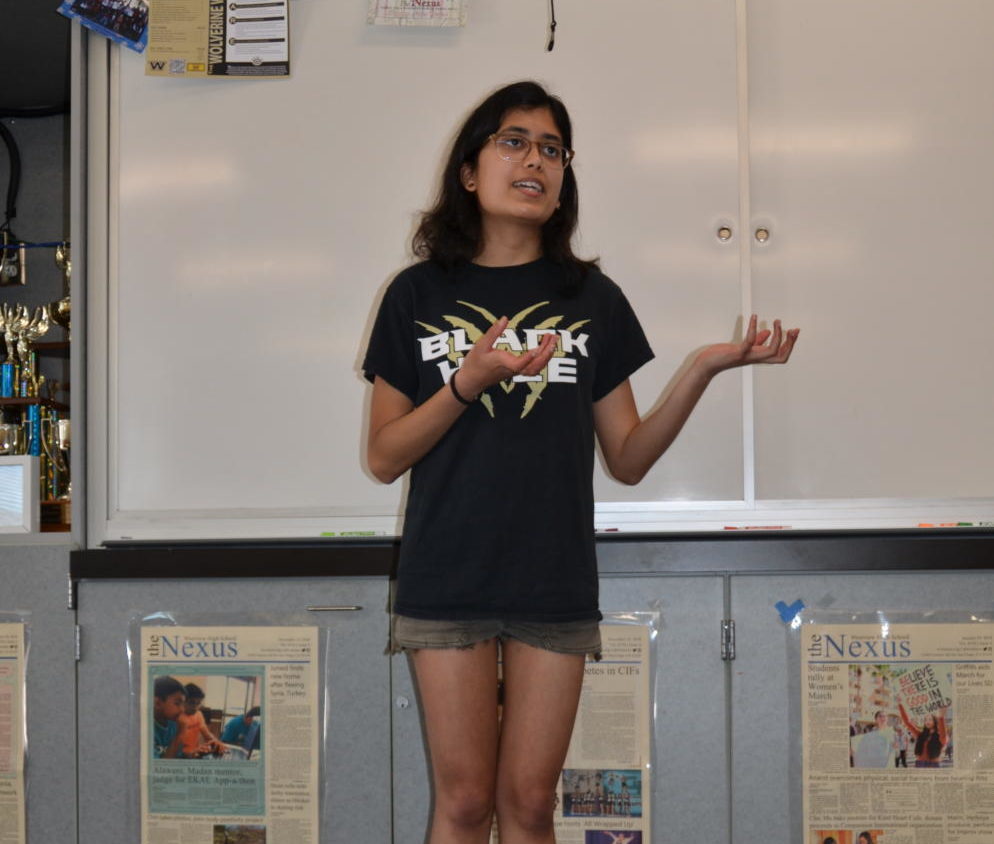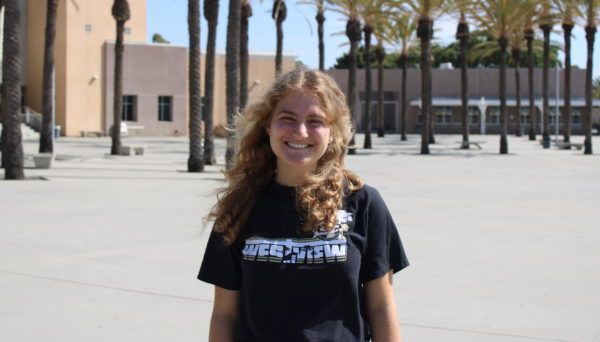Trivedi makes speech history, attends Nationals
August 26, 2022

Nirja Trivedi (11) stepped into the classroom with a fluttering mixture of excitement and nervousness, keenly aware of the two judges staring at her from across the room. She had received a selection of three prompts related to global affairs 30 minutes earlier, and now she was about to give an impromptu speech on the topic of her choice — cybersecurity and the war in Ukraine.
Trivedi stood in front of the judges and took a deep breath. When she opened her mouth, the words flowed right out like she’d been preparing forever. After seven minutes, she was dismissed. One speech down, five more to go.
Although Trivedi did not know the prompts for the National Speech and Debate Tournament until she arrived at its location in Louisville, Kentucky that June week, she had been practicing her event, International Extemporaneous Speaking, for months.
“Basically I’m speaking on international current affairs,” Trivedi said. “This involves a lot of reading the news in order to stay on top of what’s going on.”
Trivedi has developed a daily routine:
“I read about 30 minutes to an hour every day to stay on track of what’s going on, save those articles, [and digitally] organize them so I can find them when I’m competing.” When contestants are given 30 minutes to prepare their speeches, they are only allowed to access the articles they have saved digitally.
Leading up to the tournament, Trivedi had been reading about Colombia’s presidential election, what Biden has changed in his foreign policy, and more.
“[I was also] practicing speeches at least thrice a week to make sure that I was ready to give the best speech I could at nationals,” Trivedi said.
Trivedi has been competing in Speech and Debate tournaments since her freshman year, and was ready to take on the national tournament.
“There was a national qualifying tournament for each district,” Trivedi said. On March 26, she competed in a round for the Southern California district.
The top three from the national qualifying tournament can attend the national tournament, and Trivedi placed second. In May she also placed 15th in a statewide championship, also for International Extemporaneous Speaking.
Trivedi said that practicing for her event is tiring.
“Reading for an hour every day, practicing speeches… After a while, I’m reading the news and I’m numb to it,” she said. “In that way it’s exhausting sometimes.” But with her unwavering passion for the event, she perseveres.
This is partly because Trivedi sees International Extemporaneous Speaking’s prompts as solution-oriented.
“That’s what really interests me, because in the end, we want answers tao big questions,” Trivedi said. “It’s really important to know the root causes and ugly truths about certain things in order to solve them.” The desire to find solutions to serious problems gives her motivation to constantly learn more and perform better.
Trivedi’s event gives her an opportunity to investigate issues that exist beyond her own country.
“I chose International Extemporaneous speaking because I want to know more about the world around me, and I feel like we talk enough about the United States.”
During the week of the National Speech and Debate Tournament, Trivedi arrived at the University of Louisville with her parents and no other teammates.
“I was the first and only student [from Westview] to make it to Nationals,” she said. “Everyone else has a whole team, and they stay in a hotel and do that whole team thing, but for me I was kind of just on my own. And it was kind of lonely at times too.”
Having no coach with her had other downsides too.
“I didn’t have anyone organizing things for me or registering things for me,” she said. “I booked the flights, I found out how to register on their site, I got all the forms signed, and it took me like three tries to get the vaccine confirmation. A lot of my time and preparation in Speech and Debate goes into admin work.”
Usually in a larger Speech and Debate team, competitors would not bear all these responsibilities on their own. Her first morning in Kentucky, Trivedi reassured herself: “you know, the fact that I made it this far is good enough.”
Trivedi experienced some lingering self-doubt after barely making it to the State Tournament the month prior. She said she knew it was going to be hard, but she resolved that, in her words, she “was just going for the experience.”
There were six preliminary rounds, during which Trivedi gave six different speeches. Her topics ranged from potential solutions for COVID-19 outbreaks in the Caribbean, to negotiations in North Korea, to how noise pollution could threaten the environment worldwide.
“It can be pretty hard sometimes, especially when [a prompt is] about a really niche topic,” Trivedi said. “I kind of work around that by understanding that the judges that I’m presenting to probably aren’t more informed about these topics than I am, so I [speak] down to a level that I understand.”
Despite her best efforts, Trivedi didn’t make it to the elimination rounds. Nevertheless, she said she still gained a lot from the process.
“I made friends from Ohio, South Dakota, Indiana – places that I would never really go to, and people that I would never really interact with,” she said. “We all had this common link of speech and debate. Not just different places, but different backgrounds — I met people from private schools, with hired coaches at their school.”
The national tournament opened her eyes to the reality of high-level competition in speech and debate: students from private schools with well-funded programs tend to fare much better.
“Six out of the seven finalists [this year] were from private schools,” Trivedi said. “Sometimes it’s hard not to feel discouraged by the fact that there are other schools out there who have really robust Speech and Debate programs that have been going on for years, [which] have multiple coaches, a lot of funding, go to away tournaments all the time, and every year spin out national champions. I’ve definitely been, like, ‘Oh, there’s no way I can match up to this.’”
But even knowing this, Trivedi said she believes strongly that “if you want something you can get it, despite where you are from or what resources you have. So, for that reason I’m going to continue working really hard. But it’s definitely extra work for people who go to public schools.”
Trivedi also learned another lesson — the complex impact of the COVID-19 pandemic on educational inequality. During the peak of the outbreak, most tournaments were online. She was able to attend tournaments across the country from the safety of her home office. Whereas in-person competitions, such as the one she attended this June, require expensive traveling and extensive preparation, Trivedi argues that new opportunities were created for many students during virtual learning.
“A lot of barriers were broken, [because] anyone can compete from a Zoom screen,” Trivedi said. “I think that’s all [changing] this year, as there’s a huge push to go back in-person.”
Much of the general consensus has been focused on how switching to virtual schooling tends to disadvantage students from lower-income households, but certain activities like Speech and Debate could actually be more inclusive online, as long as students have devices.
“I feel like everyone’s like, educational inequality increased during COVID-19. But I feel like, in many ways, it decreased,” Trivedi said. The transition back to in-person activities is making this problem relevant once more.
Overall, Trivedi said she gained the context of new perspectives.
“The world is so much bigger than I think it is,” she said “The United States is so much bigger than I think it is. I feel like I live in a bubble.”
The people she met proved to her that there is a lot to learn beyond the comfort of state lines or country borders.
“[The] kind of warmth that a lot of people there showed me is something that I won’t forget,” she said.
Trivedi seeks to continue to expand her world in the near future.
“I’m going to try again to go to State Qualifying and National Qualifying rounds in the spring,” Trivedi said.
Trivedi also wants to try and attend the Yale Invitational Speech & Debate High School Tournament this September, an exclusive Parliamentary Debate Tournament renowned nationally. In addition, Trivedi will continue attending local tournaments in San Diego, with a focus on learning and having fun.
“I’ll keep practicing,” she said, “and we’ll see where it goes from there.”


